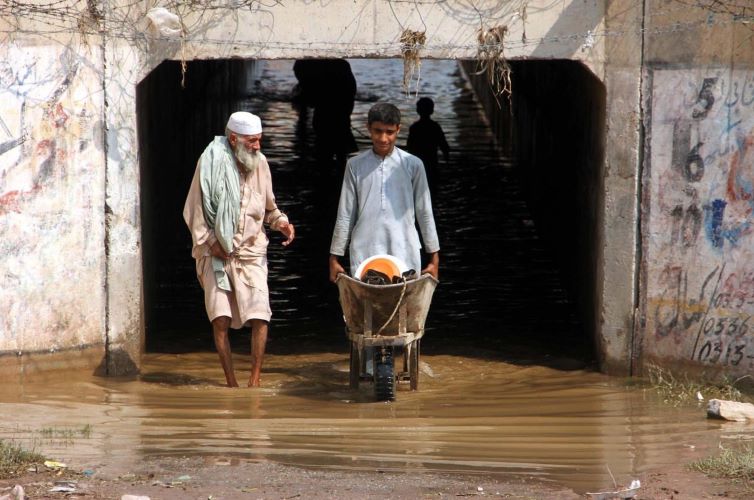
The first and foremost priority for flood management in Pakistan, or anywhere, should be credible, actionable, comprehensible and accurate (as far as possible) early warnings
Daanish Mustafa
How would a decolonized water perspective and practice mitigate the effects of the type of floods that Pakistan is witnessing in 2022? If decolonizing water is about recentring the multiple layers of meaning and practice that are associated with water at the local and indigenous level, then we have to move beyond the obsession with dams and mega infrastructure projects.
Pakistani water managers (like their counterparts in most of the global South) suffer from an acute case of mega-projectivitis: a deadly disease caused by modernity and a blind commitment to colonial thinking and practices. Much of the extensive infrastructure development in the Indus Basin – including dams, barrages, canals and levees – has served to exacerbate the flood pulses of the basin’s rivers. The colonial engineering paradigm has exchanged high frequency-low intensity events, which were ecologically beneficial, for low frequency-high intensity events which wreak the kind of destruction we are witnessing today in Pakistan.
Have some faith that the people of Pakistan own their land and water, and are the greatest custodians and scholars of it
I outline below what a decolonized water approach to flood management would be like in Pakistan.
The first and foremost priority for flood management in Pakistan, or anywhere, should be credible, actionable, comprehensible and accurate (as far as possible) early warnings. A colonial water approach would prioritize the accuracy of the models. A decolonial approach would emphasize:
The credibility of the warning, by engaging local communities through schools and civil society in data collection and information sharing. The warning system would also learn from vernacular practices of forecasting and experiential meteorology.
Actionable practicality, by engaging local communities in vulnerability assessments and floodplain mapping to chart out who can take what action in the event of an emergency, paying particular attention to intersectional gender dynamics.
Comprehensibility, by again focusing on conveying timely warnings in jargon-free vernacular languages which are comprehensible to everyone, particularly women and marginalized communities.
Listen to the people who live on the riverbanks
The second priority has to be drainage. Every farmer or even local child knows which way the water flows. They should be listened to, and any obstructions standing in the way of the natural drainage of waterways should be removed. This will not only help mitigate the intensity of the flood peaks, but also the duration of the inundation. Essential infrastructure like roads, railway lines and canals should have culverts, bridges and/or siphons to facilitate natural drainage.
Third, cancel and prevent real estate investments on floodplains, including housing societies, hotels, and expressways and so on. Floodplains are best used as parks. And along the same lines, please give some wetlands back to the rivers. One could not hope for a more effective moderator of flood peaks than wetlands. In addition, wetlands have multiple ecological benefits in terms of groundwater recharge, biodiversity conservation and carbon sequestration.
Fourth, undertake vulnerability mapping exercises for river plain communities in consultation with those communities. Knowing patterns of household and community vulnerability will help target relief and recovery aid in the aftermath of floods to those most in need, instead of the usual pattern of flailing around with inappropriate aid. This could easily be undertaken using some existing vulnerability assessment indices, by for example the irrigation or revenue departments of Pakistan, which have the deepest penetration at the local level in the country.
Fifth, help local communities further reinforce their existing flood adaptation measures, for example building homes and animal pens on elevated platforms. For those who cannot afford to build those shelters, the state should provide conveniently located human and animal shelters. In rural South Asia, people will not evacuate if their animals cannot.
Decentralized governance is the key
Sixth, decentralize governance to local government. The de facto federal but de jure centralized Pakistani state assumes the flood-affected to be helpless victims in need of central government help. Nothing could be further from the truth. People and communities come together, and the first source of help is always local. Work with democratic, empowered local governments who know their surroundings best for flood management and relief. The command-and-control approach perpetuated through the colonial bureaucracy is dysfunctional.
All you need is some humility and deprogramming of the colonial mindset. Decolonized water is the only hope going forward in a climate-changed present.
Seventh, prioritize women, gender minorities and marginalized communities as the recipients and administrators of aid. The patriarchal ethos in relief aid distribution only serves to further marginalize women, children and those most in need. Draw upon the strengths and capacities of women, for them to be conduits for articulating needs and disbursing aid.
Eighth, reintroduce geography and environmental sciences in the school curriculums of Pakistan. The forty-year absence of the subjects and their substitute phony history in the name of Pakistan studies has not yielded any more patriotic or enlightened citizens. Instead, they have produced people more ignorant of the challenges that the country is facing. Build a culture of decolonial environmental sensitivity from school onwards.
Handle the secondary hazards
Ninth, do not focus on single hazards. All hazards such as floods have secondary and cascading hazards associated with them. For example, in Karachi the majority of deaths during floods are from electrocution due to poor electricity infrastructure. In rural areas, people die of snake bites and waterborne diseases. Pay attention to and plan for secondary local hazards that actually hurt people. Floods by themselves rarely cause so much direct damage as their secondary consequences.
Lastly, and most importantly, to sum up the essence of all of the above: find some new textbooks which are not written by dead white men, but in fact combine the insights of modern science with experiential local environmental knowledge and cosmologies. Have some faith that the people of Pakistan own their land and water, and are the greatest custodians and scholars of it. Benefit from their wisdom. All you need is some humility and deprogramming of the colonial mindset. Decolonized water is the only hope going forward in a climate-changed present.
Click here for Part-I
__________________
 Daanish Mustafa is a professor in critical geography at King’s College London. His research includes water resources, hazards and development geography. He also publishes and teaches on critical geographies of violence and terror.
Daanish Mustafa is a professor in critical geography at King’s College London. His research includes water resources, hazards and development geography. He also publishes and teaches on critical geographies of violence and terror.
Courtesy: The Third Pole (Posted on September 12, 2022)